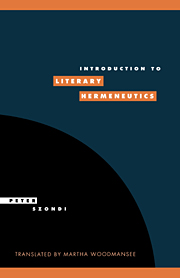Book contents
- Frontmatter
- Contents
- Foreword by Joel Weinsheimer
- Translator's preface
- Chapter 1 Introduction
- Chapter 2 Chladenius, I
- Chapter 3 Chladenius, II
- Chapter 4 Chladenius, III
- Chapter 5 Chladenius, IV
- Chapter 6 Meier, I
- Chapter 7 Meier, II
- Chapter 8 Ast
- Chapter 9 Schleiermacher, I
- Chapter 10 Schleiermacher, II
- Afterword by Jean Bollack
- Index
Chapter 1 - Introduction
Published online by Cambridge University Press: 14 December 2009
- Frontmatter
- Contents
- Foreword by Joel Weinsheimer
- Translator's preface
- Chapter 1 Introduction
- Chapter 2 Chladenius, I
- Chapter 3 Chladenius, II
- Chapter 4 Chladenius, III
- Chapter 5 Chladenius, IV
- Chapter 6 Meier, I
- Chapter 7 Meier, II
- Chapter 8 Ast
- Chapter 9 Schleiermacher, I
- Chapter 10 Schleiermacher, II
- Afterword by Jean Bollack
- Index
Summary
Literary hermeneutics is the theory of the exegesis, interpretatio or interpretation, of literary works. Although hermeneutics has been highly influential in shaping philosophy and, as self-reflection, humanistic inquiry in general in this century, it is not at all certain whether a specifically literary hermeneutics exists at present. Wilhelm Dilthey's essay “The Development of Hermeneutics” appeared in 1900; a significant part of his œuvre is devoted to developing a theory of understanding, especially historical understanding, to serve as a foundation for humanistic inquiry. In Heidegger's Being and Time (1927) an important place is given to the analysis of understanding as an “existential concern” as well as to the presentation of the “hermeneutic circle” and the rootedness of this circle in the “existential constitution of Dasein [human existence] – that is, in the understanding which interprets.” Gadamer's Truth and Method appeared three decades later, in 1960; its subtitle is “Essentials of a Philosophical Hermeneutics.” Finally, in 1967, Emilio Betti's work Teoria generate delta interpretazione (1955) appeared in German translation. Hermeneutics is therefore hardly a neglected discipline. Nor have the humanities or indeed literary studies resisted or dismissed the stimulus of Dilthey, Heidegger, and Gadamer. The fact that a specifically literary hermeneutics scarcely exists today stems rather from the nature of the hermeneutics that actually does exist.
Dilthey's essay of 1900, which reviews the rise of hermeneutics in programmatic fashion, posits that hermeneutics developed in an orderly way.
- Type
- Chapter
- Information
- Introduction to Literary Hermeneutics , pp. 1 - 13Publisher: Cambridge University PressPrint publication year: 1995

